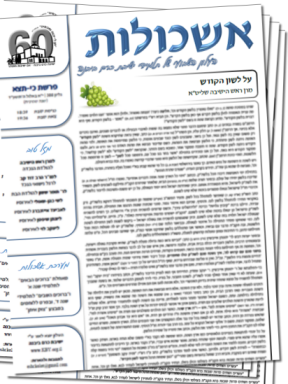One Critical Moment
הרב שלמה פרידמן
In one of the most terrifying parts of the תוכחה the תורה tells us that if we stray from the path that we are meant to follow, then one of the consequences could be ואכלתם בשר בניכם ובשר בנותיכם תאכלו. Aside from the obvious meaning of this פסוק there might be some additional important lesson to be learned. One might ask why the apparent redundancy in the פסוק? Would it not be sufficient to just have the first part of the verse? Perhaps one can suggest the following.
Often our impulses, our יצר הרע will push us to do things which go against our values, our aspirations, and our best interests. The moment immediately after we've failed is a most critical one. It is the moment when we realize that we've been duped. The יצר הרע lied to us. We thought that we'd feel so wonderful and benefit so much from the sin, but instead we feel empty. At this moment we are at a most important junction. One option - an option which is often taken, is to rid ourselves of the feelings of guilt by convincing ourselves that what we did is not so terrible after all. After the wheel, the concept of rationalization is one of the oldest inventions. We give ourselves the most creative explanations for what took place. We convince ourselves that what we did was not really improper. However, at that moment following the sin, there's a totally different path we might take. The terrible feelings if guilt, the emptiness that we experience, can provide the fuel needed for a proper repentance. The regret one feels at that moment can inspire a full תשובה.
When דוד המלך hears the משל of the כבשת הרש and is told by the נביא that אתה האיש he seizes the moment and immediately says חטאתי. Right away he is told that his תשובה is accepted. (Rabbi Soloveitchik points out that שאול המלך did not acknowledge his sin right away. The path of rationalization that he took, prevented his תשובה from being fully accepted.)
The מדרש in פרשת תולדות on the פסוק that says וירח את ריח בגדיו relates the story of יוסף משיתא. When the Romans entered the בית המקדש with intention of looting it's treasures, they sent a Jew named יוסף משיתא and they told him that whatever he takes, will be his. He in fact entered the מקדש and walked out with a golden מנורה. The Romans told him that such a candelabra is only appropriate for royalty, but he should go in again and this time they certainly will let him keep whatever he takes out. However, this time he refused. Despite the Romans' encouragement which was followed by the threat of torture, he staunchly stuck to his refusal. He said די שהכעסתי את קוני פעם אחת. How are we to understand the behavior of יוסף משיתא? Why was he so opposed to going in again if he was willing to go the first time? We might suggest that after he had entered the first time , he suddenly realized how terrible an act he had committed to plunder the בית המקדש, and that feeling of guilt was instrumental in bringing about the subsequent תשובה.
In light of this insight, we might understand why theפסוק doesn't simply say ואכלתם בשר בניכם. The פסוק wants to tell us that even after one did that terrible act of the consumption of one's offspring and the feelings of revulsion which follow, nevertheless one will be driven to do such an act again. The initial shock will not inspire the regret that would prevent one from repeating the same thing again.
On a positive note, it should be mentioned that just as the second after the sin is an important junction, so is true of the moment after we've overcome our יצר and have done a precious מצווה. We should try to relish that wonderful feeling of winning the battle that we just fought and the victory we achieved. Although haughtiness is not in order and we need to be thankful for the סייעתא דשמיא which helped us overcome our animalistic urges, we should savor the joy of being successful in choosing to do the right thing. Doing so can help provide encouragement to continue to grow and to do our best in the never-ending battle for spiritual growth.
השיעור ניתן בכ' אייר תשפ"ג
קוד השיעור: 9268
לשליחת שאלה או הארה בנוגע לשיעור:

.jpg)


.jpg)